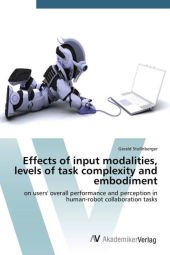 Neuerscheinungen 2014Stand: 2020-02-01 |
Schnellsuche
ISBN/Stichwort/Autor
|
Herderstraße 10
10625 Berlin
Tel.: 030 315 714 16
Fax 030 315 714 14
info@buchspektrum.de |

Gerald Stollnberger
Effects of input modalities, levels of task complexity and embodiment
on users´ overall performance and perception in human-robot collaboration tasks
2014. 176 S. 220 mm
Verlag/Jahr: AV AKADEMIKERVERLAG 2014
ISBN: 3-639-67884-2 (3639678842)
Neue ISBN: 978-3-639-67884-0 (9783639678840)
Preis und Lieferzeit: Bitte klicken
Human-Robot Interaction (HRI) is a growing multidisciplinary field of science. The focus of HRI is to study the interaction between robots and humans with a contribution of social science, computer science, robotics, articial intelligence, and many more. Nowadays one of the research goals of HRI is to enable robots and humans to work from shoulder to shoulder. In order to avoid misunderstandings or dangerous situations, choosing the right input modality, especially for different levels of task complexity, is a crucial aspect for successful cooperation. It can be assumed, that for specic levels of task complexity, there is always one complementing input modality which increases the corresponding user satisfaction and performance. In order to identify the most appropriate input modality in relation to the level of task complexity, two user studies are presented in this thesis.
Gerald Stollnberger is currently working as a research fellow at the HCI Usability Unit of the ICTS Center. He holds a bachelor´s and a master´s degree in Applied Computer Sciences from the University of Salzburg, 2014. The focus of his research is on adaptive multimodal interfaces for human-robot interaction/collaboration tasks.


